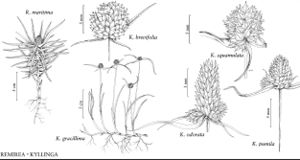Kyllinga
Descr. Icon. Rar. Pl., 12, plate 4, fig. 3. 1773.
Herbs, annual or perennial, cespitose or not, rhizomatous or not. Culms solitary or not, trigonous. Leaves basal; ligules absent; blades flat or V-shaped in cross-section. Inflorescences terminal, rarely pseudolateral, spikes 1–4, sessile, densely ovoid or cylindric; spikelets [15–] 40–150 per spike, not readily distinguished by unaided eye; involucral-bracts 2–4, spreading or erect, leaflike. Spikelets: scales 2 (–3), distichous; proximal scale subtending bisexual flower; distal scale empty or subtending 1–2 stamens, often abortive. Flowers bisexual or staminate; perianth absent; stamens 1–3; styles linear, 2-fid, base persistent. Achenes biconvex, laterally compressed.
Distribution
Mostly tropical or warm-temperate regions worldwide
Discussion
Species 40–45 (5 in the flora).
Tropical Africa contains the greatest diversity of Kyllinga species.
The genus is closely related to Cyperus and has been treated as a subgenus.
Selected References
None.
Lower Taxa
Key
| 1 | Midvein of floral scales winged, laciniate; anthers 2 mm. | Kyllinga squamulata |
| 1 | Midvein of floral scales not winged, ciliate or glabrous; anthers less than 2 mm. | > 2 |
| 2 | Plants widely creeping, rhizomatous. | > 3 |
| 2 | Plants densely cespitose, rhizomatous or not. | > 4 |
| 3 | Longest bract erect; style 0.6–1.2 mm. | Kyllinga brevifolia |
| 3 | Longest bract horizontal to slightly reflexed; style 1.8–2.2 mm. | Kyllinga gracillima |
| 4 | Plants perennial; spikes whitish; achenes with whitish stipitate base. | Kyllinga odorata |
| 4 | Plants annual; spikes pale greenish; achenes light brown. | Kyllinga pumila |
"shortened" is not a number.
